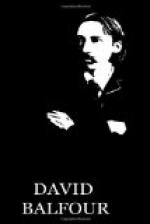“I am a thousand miles from judging,” I replied. “And I give you my word I do rejoice to know your heart is lightened. If my face fell at all, as I suppose it must, you will allow this is rather an ill day for compositions, and the people in power extremely ill persons to be compounding with. I have Symon Fraser extremely heavy on my stomach still.”
“Ah!” she cried, “you will not be evening these two; and you should bear in mind that Prestongrange and James More, my father, are of the one blood.”
“I never heard tell of that,” said I.
“It is rather singular how little you are acquainted with,” said she. “One part may call themselves Grant, and one Macgregor, but they are still of the same clan. They are all the sons of Alpin, from whom, I think, our country has its name.”
“What country is that?” I asked.
“My country and yours,” said she.
“This is my day for discoveries, I think,” said I, “for I always thought the name of it was Scotland.”
“Scotland is the name of what you call Ireland,” she replied. “But the old ancient true name of this place that we have our foot-soles on, and that our bones are made of, will be Alban. It was Alban they called it when our forefathers will be fighting for it against Rome and Alexander; and it is called so still in your own tongue that you forget.”
“Troth,” said I, “and that I never learned!” For I lacked heart to take her up about the Macedonian.
“But your fathers and mothers talked it, one generation with another,” said she. “And it was sung about the cradles before you or me were ever dreamed of; and your name remembers it still. Ah, if you could talk that language you would find me another girl. The heart speaks in that tongue.”
I had a meal with the two ladies, all very good, served in fine old plate, and the wine excellent, for it seems that Mrs. Ogilvy was rich. Our talk, too, was pleasant enough; but as soon as I saw the sun decline sharply and the shadows to run out long, I rose to take my leave. For my mind was now made up to say farewell to Alan; and it was needful I should see the trysting wood, and reconnoitre it, by daylight. Catriona came with me as far as to the garden gate.
“It is long till I see you now?” she asked.
“It is beyond my judging,” I replied. “It will be long, it may be never.”
“It may be so,” said she. “And you are sorry?”
I bowed my head, looking upon her.
“So am I, at all events,” said she. “I have seen you but a small time, but I put you very high. You are true, you are brave; in time I think you will be more of a man yet. I will be proud to hear of that. If you should speed worse, if it will come to fall as we are afraid—O well! think you have the one friend. Long after you are dead and me an old wife, I will be telling the bairns about David Balfour, and my tears running. I will be telling how we parted, and what I said to you, and did to you. God go with you and guide you, prays your little friend: so I said—I will be telling them—and here is what I did.”




